Permanent dentures offer a reliable and aesthetically pleasing solution for those seeking to restore their smiles. In this article, we will explore what permanent dentures are, the different types available, their benefits, the process of acquiring them, and essential care tips to ensure their longevity.
-
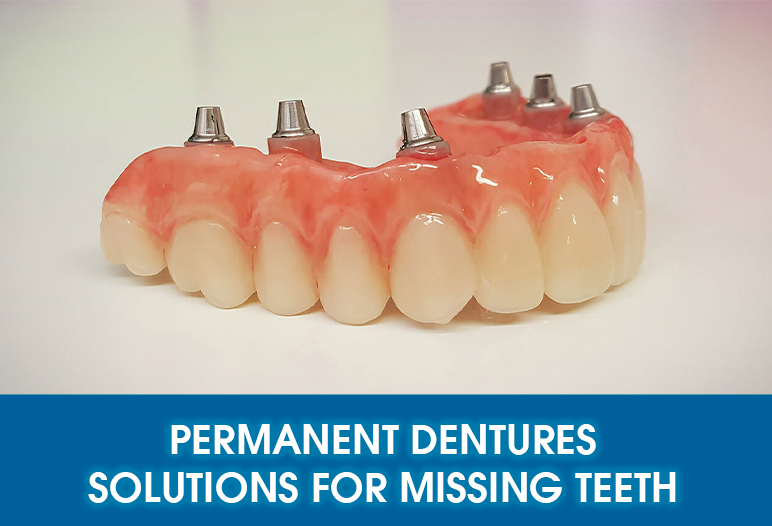
permanent dentures
What Are Permanent Dentures Called?
Permanent dentures, also known as permanent false teeth (which are often referred to as non removable dentures or non removable false teeth ) are a modern approach to replacing missing teeth using dental implants. Unlike traditional removable dentures, which need to be taken out for cleaning and maintenance, permanent dentures are designed to remain securely in place at all times. This stability is achieved through permanent denture implants, which are titanium posts surgically placed in the jawbone. These implants fuse with the bone over time—a process called osseointegration—creating a strong foundation for permanent artificial teeth.
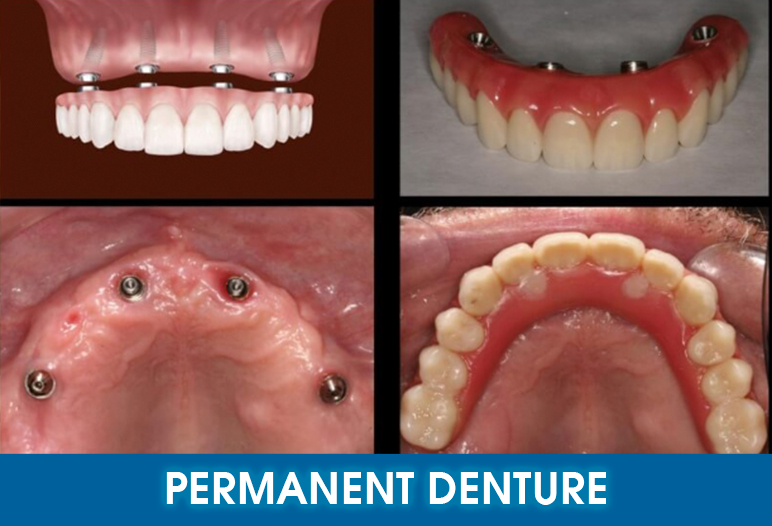
Can you get permanent dentures?
If you’re considering can you get permanent dentures, evaluate your dental health and consult with a dental professional to determine if you qualify for permanent dentures or perm dentures that can significantly improve your quality of life. Here are some cases where individuals might be suitable candidates for permanent top dentures or other types of fixed dentures:
- Significant Tooth Loss: If you have lost multiple teeth, especially in a row, you may benefit from permanent dentures to restore function and aesthetics.
- Healthy Jawbone: Candidates should have sufficient jawbone density to support the dental implants that anchor permanent dentures. If the jawbone has deteriorated, bone grafting may be necessary.
- Good Oral Health: Individuals should have overall good oral health, with no active gum disease or untreated dental issues, to ensure the success of permant dentures.
- Desire for Stability: If you prefer a more stable solution than traditional removable dentures, non-removable false teeth offer enhanced comfort and confidence while eating and speaking.
- Willingness to Undergo Surgery: Since can dentures be permanent usually involves a surgical procedure to place dental implants, candidates must be willing to undergo this process.
Dental implants vs permanent dentures: What is the difference?
Fixed restoration involves implanting titanium posts into the jawbone to create a solid foundation for attaching fixed dentures. Apart from the basic difference in material (implants are made of titanium, while permanent dentures can be made of plastic, porcelain, etc.), implants and permanent dentures differ in the following factors.
| Comparison Criteria | Dental Implants | Permanent Dentures |
| Role | Root of the tooth | Crown of the tooth |
| Function | Bear load, support restoration | Aesthetics, chewing |
| Implementation Stage | First stage, surgical placement | After implant healing, attachment to implants |
| Cost | From $4000 (in Vietnam for All on 4 implants) | From $1320 (in Vietnam) |
What do permanent dentures look like?
Permanent dentures are designed to look and feel like natural teeth. They are typically made from a combination of materials such as porcelain, zirconia, or acrylic, which can be customized to match the color and shape of your existing teeth. When properly fitted, permanent dentures should blend seamlessly with your smile.
The components that make up permanent fixed dentures (or permanent artificial teeth) include:
- Base: This is the foundation of the dentures, typically made from plastic or metal, which helps keep the permanently fixed false teeth stable. The base is often colored to match the natural gums, creating a natural appearance for the dentures.
- Artificial Teeth: The teeth are crafted from materials like porcelain or acrylic, designed to resemble real teeth in color, shape, and size. These permanent artificial teeth are securely attached to the base using strong bonding methods.
- Implant Posts: In the case of permanent upper dentures supported by implants, the implant posts are placed into the jawbone, providing a solid foundation to secure the dentures. These posts are usually made of titanium, a material known for its biocompatibility.
- Connectors (Abutments): When implants are used, the abutments serve as connectors between the implant posts and the denture base. They help position and hold the permanently fixed false teeth securely in place.
- Liner Material: Some dentures may feature a soft liner to enhance comfort and reduce pressure on the gums.
Before and after getting permanent dentures
By looking at before and after images of fixed denture procedures, you can see the dramatic transformation it can make. It will revolutionize your life, health, and appearance.
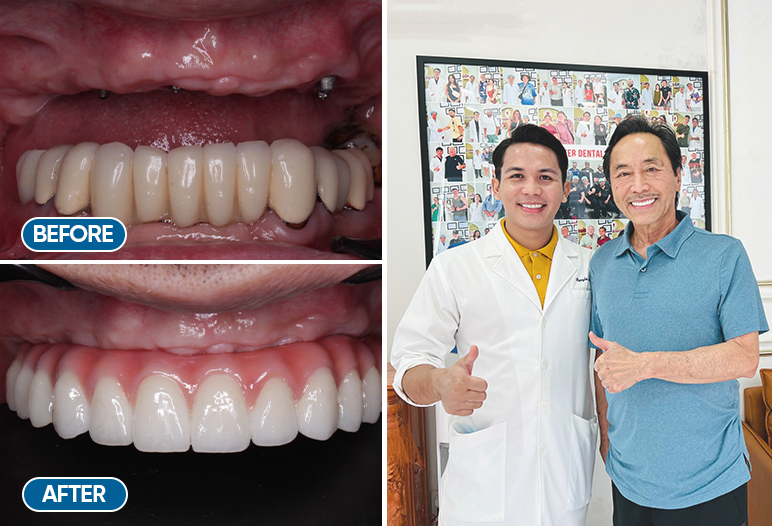


Can you have permanent dentures? Get a free doctor consultation now!
Types of Permanent Dentures
When considering permanent dentures, it’s essential to understand the various options available:
Implant-Supported Dentures
This is the most widely utilized form of permanent dentures. In this option, permanent denture implants are surgically embedded into the jawbone, creating a stable base for the denture. Once fully integrated, the denture is attached, ensuring it remains firmly in place, allowing for a more natural eating and speaking experience.
Fixed Bridges
If only a few teeth are missing, fixed bridges can be anchored to either natural teeth or dental implants situated on either side of the gap. This method offers a secure and aesthetically pleasing solution when adjacent healthy teeth can be used for support.
Overdentures
For individuals who still have some remaining natural teeth or implants, overdentures provide a beneficial solution. They rest on a limited number of existing teeth while offering additional stability compared to traditional removable dentures. This type of denture allows for a more comfortable fit and enhanced functionality.
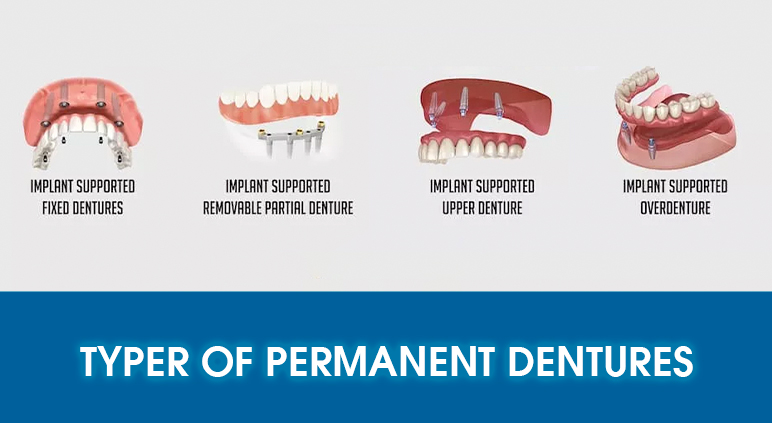
Advantages of Permanent Dentures
The transition from traditional dentures to permanent dentures presents many significant advantages:
Improved Stability and Security
One of the most pronounced differences between permanent dentures and traditional dentures lies in their stability. Traditional dentures often shift or slip during daily activities, causing discomfort and anxiety. In contrast, permanent dentures stay securely in place, allowing users to engage confidently in social situations. Many wonder, “Can regular dentures be permanently attached?” The answer lies in the implants that anchor these dentures, providing unparalleled security.
Enhanced Comfort
Many individuals find traditional dentures uncomfortable due to the use of adhesives. Permanent dentures eliminate these concerns, offering a more natural feel that integrates comfortably with the mouth’s structure.
Improved Speech and Pronunciation
The secure fit of permanent dentures leads to improved speech clarity. Users can communicate more effectively without worrying about their dentures slipping, helping to restore confidence in social interactions.
Enhanced Chewing Function
Another notable advantage is the ability to eat a wider variety of foods. Traditional dentures often limit dietary choices, whereas permanent dentures restore full chewing function, enabling individuals to enjoy their favorite meals again.

Prevention of Bone Loss
One significant benefit of permanent denture implants is the prevention of bone loss. Dental implants stimulate the jawbone, maintaining its density and structure, which is vital for preserving facial contours.
Improved Oral Health
Permanent dentures contribute to better oral hygiene by creating a clean environment that reduces the risk of plaque buildup and gum disease. Their secure attachment minimizes food particles getting trapped between the dentures and gums.
Enhanced Self-Confidence
Lastly, the aesthetic appeal of permanent dentures vastly improves self-esteem. With a beautiful, restored smile, individuals often feel renewed confidence in their appearance.
The Process of Getting Permanent Dentures
Understanding the process of acquiring permanent dentures is critical for anyone considering this dental transformation.
Initial Consultation and Assessment
The journey begins with an initial consultation with a qualified dentist. During this appointment, a comprehensive evaluation of your oral health will take place. The dentist will assess your jawbone structure, examine any remaining teeth, and discuss your dental history. X-rays and impressions of your teeth may be taken to develop a customized treatment plan.
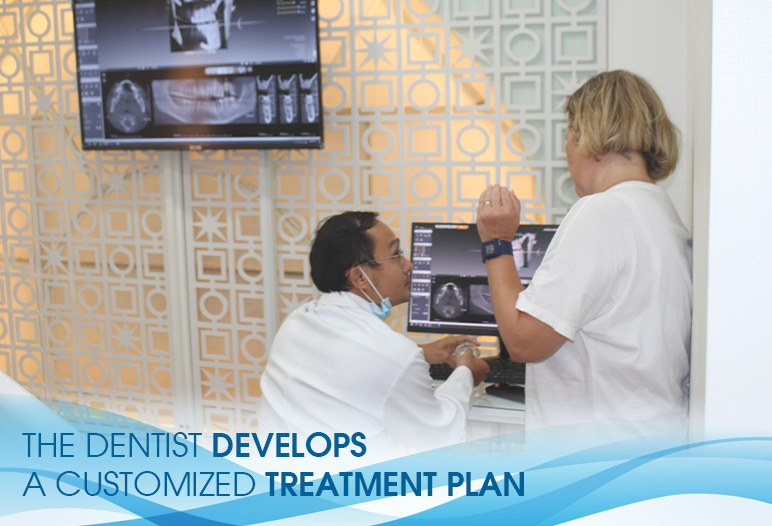
Preparation and Impressions
Once your treatment plan is established, the preparation phase begins. This may involve extracting compromised teeth or performing procedures such as bone grafting. After the preliminary preparations are complete, impressions of your teeth and gums are taken to create precise replicas for crafting your custom-made permanent dentures.
Fitting and Adjustments
Once your custom dentures are fabricated in the dental lab, the fitting process begins. Your dentist will assess the dentures for fit, comfort, and alignment, making necessary adjustments until you are satisfied with how they look and feel.
Maintenance and Care of Permanent Dentures
Owning permanent fake teeth comes with responsibilities regarding maintenance and care. Implementing a diligent oral hygiene routine is essential for prolonging their lifespan.
Daily Cleaning Routines
- Brushing: Brush your dentures gently with a soft-bristled toothbrush and a non-abrasive toothpaste formulated for dentures. It’s crucial to brush your dentures at least once a day, ideally after meals.
- Flossing: Clean around your dentures and any dental implants with dental floss or interdental brushes to eliminate leftover food particles and plaque.
- Mouthwash: Rinse with an alcohol-free antiseptic mouthwash to kill bacteria and keep your mouth fresh.
Regular Dental Check-Ups
Routine visits to your dentist allow for monitoring the condition of your implants, surrounding gums, and actual dentures. These appointments provide an opportunity for adjustments and repairs to keep your smile looking its best.
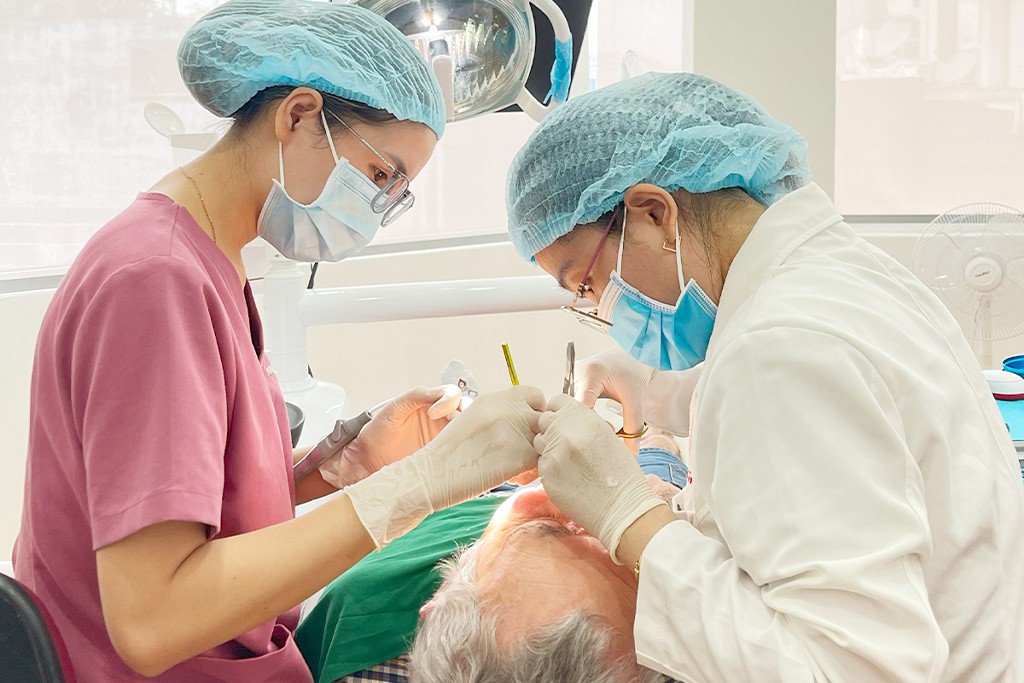
Handling Common Issues
While permanent dentures offer many benefits, minor issues can arise:
- Soreness or Irritation: Mild soreness is typical after initial placement. Your dentist may recommend specialized rinses or over-the-counter pain relievers.
- Denture Looseness or Shifting: If your dentures become loose, consult your dentist for an evaluation and adjustments.
- Inflammation or Infection: Maintain excellent oral hygiene to prevent gum issues. Signs of redness or swelling require immediate dental attention.
- Damage or Breakage: If your dentures sustain damage, seek prompt dental care for repairs or replacements.
Addressing Concerns and Misconceptions
Pain and Discomfort Expectations
Many individuals wonder about the pain associated with getting permanent dentures. While mild discomfort may occur during implant placement and the adjustment period, following your dentist’s post-operative care instructions can help ease anxiety.
Longevity and Durability
With proper care, permanent dentures can last for many years—often a decade or longer. Regular dental visits and good oral hygiene are key factors in maximizing their lifespan.
Cost Considerations
The upfront expense for permanent dentures may be higher than traditional options, but the long-term benefits often lead to savings on future dental treatments. Discussing financial options with your dental provider can help make the investment more manageable.
Conclusion
Investing in permanent dentures is a significant decision that can lead to substantial improvements in overall quality of life. Many people wonder, are there permanent dentures available? The answer is yes, and they can provide a reliable solution for those who have lost teeth. From restoring your ability to chew and speak confidently to enhancing your smile’s aesthetics, the benefits of permanent dentures outweigh the challenges.
By understanding the different types, processes, and care required, individuals can approach their dental journey with informed perspectives. Embrace the possibilities that permanent dentures offer and take the first step toward reclaiming your smile today!
FAQs
Can regular dentures be permanently attached?
Regular dentures cannot be permanently attached, but you can opt for implant-supported dentures. These dentures are fixed onto dental implants in your jaw, offering a more secure and stable solution compared to regular removable dentures.
Can lower dentures be permanently attached?
Yes, lower dentures can be permanently attached using dental implants. These are called implant-supported dentures, where the dentures are securely fixed to implants placed in the jawbone, providing a stable, long-lasting solution compared to regular removable dentures.
Lost 4 consecutive teeth, can you get permanent false teeth?
Yes, you can get permanent false teeth to replace those 4 missing teeth with permanent dental implants. We can place 2 implants where the teeth are missing and then attach a fixed bridge with 4 porcelain crowns.

 Google Reviews
Google Reviews Call
Call
SAIGON IMPLANT CENTER
Best dentist in Vietnam
Saigon Implant Center - Dental Clinic utilizes the latest technology for specialized treatment in the field of Single implant, full jaw implants, All on 4 implants, All on 6 implants, Zygoma implant....
SAIGON IMPLANT CENTER
Best dentist in Vietnam
Saigon Implant Center - Dental Clinic utilizes the latest technology for specialized treatment in the field of Single implant, full jaw implants, All on 4 implants, All on 6 implants, Zygoma implant....